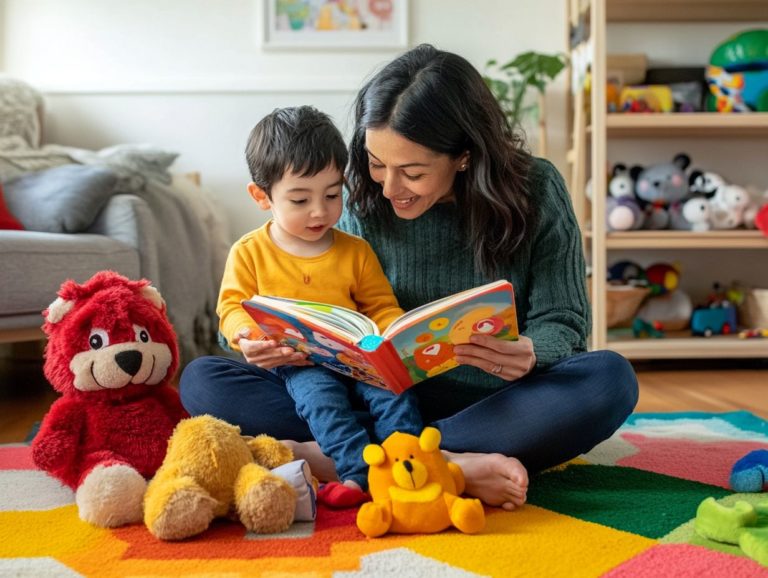The Power of Questions in Family Dynamics
Family dynamics significantly shape relationships and influence how each member interacts and communicates with one another, impacting everything from family routines to the relationship with the caregiver.
You can enhance your understanding of these dynamics through the Power of Questions. This exploration delves into how family dynamics affect relationships while emphasizing the importance of asking the right questions. Thoughtful inquiry promotes open communication and resolves conflicts, offering myriad benefits, including encouraging care and avoiding arguments.
Discover how effective questions can cultivate empathy, trust, and collaboration within your family, ultimately leading to stronger bonds, healthier interactions, and long-lasting connections.
Contents
- Key Takeaways:
- What Are Family Dynamics?
- Why Are Questions Important in Family Dynamics?
- What Types of Questions Can Be Used in Family Dynamics?
- How Can Questions Help Resolve Conflicts in Family Dynamics?
- What Are the Benefits of Using Questions in Family Dynamics?
- 1. Promotes Open Communication
- 2. Encourages Empathy and Understanding
- 3. Builds Trust and Connection
- 4. Helps Identify and Address Issues
- What Are Some Examples of Effective Questions in Family Dynamics?
- 3. ‘Can you tell me more about your perspective?’
- 4. ‘How can we work together to find a solution?’
- How Can Questions Be Used to Improve Family Dynamics?
- 1. Use Questions to Clarify Misunderstandings
- 2. Use Questions to Encourage Family Members to Share Their Thoughts and Feelings
- 3. Use Questions to Create a Safe and Open Environment for Communication
- 4. Use Questions to Foster Problem-Solving and Collaboration
- Frequently Asked Questions
- Understanding Family Dynamics Through Questions
Key Takeaways:
What Are Family Dynamics?
Family dynamics encompass the intricate web of interactions, communication styles, and mutual influences among family members. These relationships are pivotal in shaping individual behaviors, values, and the overall well-being of the family unit.
Recognizing these dynamics is vital for parents and caregivers, as it equips them to tackle parenting challenges and enhance communication skills within the family. By nurturing a healthy environment that emphasizes accountability in parenting and fosters moral development, families can cultivate wisdom and encourage positive behaviors in children. Additionally, this understanding helps in dealing with ethical issues and avoiding emotional harm.
This approach ultimately leads to enduring connections and a spirit of teamwork within the family, fostering positive behavior and internal wisdom.
How Do Family Dynamics Impact Relationships?
Family dynamics play a crucial role in shaping the relationships among family members, influencing how you communicate and resolve conflicts. These dynamics determine the nature of interactions between parents and children, impacting everything from daily routines to the capacity for engaging in difficult conversations.
By honing effective communication skills, you can cultivate understanding and compassion for others, which are essential for building strong and healthy relationships. Establishing family guidelines and posing thoughtful questions can create an environment that encourages open dialogue and nurtures internal wisdom.
For example, when you actively listen to your children’s concerns and validate their feelings, you foster trust and emotional security within your household. On the other hand, a lack of communication or dismissive attitudes can lead to misunderstandings, creating barriers that breed resentment or withdrawal.
Engaging in conflict resolution through thoughtful questions not only clarifies differing perspectives but also give the power tos family members to express themselves constructively. By employing positive parenting techniques such as setting clear expectations and modeling respectful behavior you can significantly enhance overall family dynamics, paving the way for harmonious relationships that can withstand challenges.
Why Are Questions Important in Family Dynamics?
Questions hold immense significance in family dynamics, serving as gateways to effective communication and deeper connections among family members. By harnessing the Power of Questions, you can inspire your children to take responsibility for their actions, cultivate moral reasoning, and foster accountability within your parenting approach.
Thoughtful, open-ended inquiries invite families to engage in challenging conversations, reflect on their practices, and clear up any misunderstandings. Moreover, these questions promote self-awareness and strengthen parent-child relationships, which are essential for nurturing emotional well-being and stability within the family.
What Types of Questions Can Be Used in Family Dynamics?
In family dynamics, you can utilize various types of questions to enhance communication and understanding, such as quality questions and open-ended inquiries. These approaches encourage family members to share their thoughts and feelings more openly, fostering a dialogue that nurtures emotional development and moral reasoning.
For example, when you ask, “What are your thoughts on this situation?“, you invite deeper reflection, helping to cultivate a sense of understanding and compassion, especially in children, and encouraging them to take responsibility for their actions.
Conversely, closed questions like “Did you have a good day?” often lead to simple one-word responses, stifling the conversation. Instead, consider open questions such as “What was the highlight of your day?“. This invites richer, more detailed responses, allowing family members to share their experiences and strengthen their connections.
Additionally, quality questions that prompt critical thinking, like “How did that make you feel?“, can have a profound impact, fostering a stronger relationship with the caregiver.
Engaging in such discussions not only enhances understanding but also showcases your familial support, ultimately leading to stronger relationships built on trust and empathy.
How Can Questions Help Resolve Conflicts in Family Dynamics?
Questions are powerful tools for navigating conflicts within family dynamics, allowing you and your loved ones to address disagreements with empathy and understanding. By posing thoughtful questions, you can uncover the root causes of conflicts and steer discussions toward effective solutions.
Questions like “How did you feel when this happened?” or “What can we do to improve this situation?” provide everyone with the opportunity to share their thoughts and feelings, fostering impactful communication and a sense of accountability in parenting. This approach is essential for cultivating a harmonious family environment.
Encouraging your family members to engage in dialogue through open-ended questions creates a space where everyone feels heard and valued. For example, when you ask, “What do you think led to this disagreement?“, you invite reflection on various perspectives, nurturing an atmosphere of collaboration rather than competition.
Follow-up questions like “How can we prevent similar issues in the future?” shift the focus from blame to solution-oriented thinking. Such inquiries not only deepen understanding but also empower each family member to take an active role in conflict resolution, reinforcing bonds and trust within the family unit.
What Are the Benefits of Using Questions in Family Dynamics?
Utilizing questions within family dynamics provides a wealth of benefits that can elevate relationships and enhance overall family well-being. Questions serve as a spark for open conversation, fostering empathy and understanding while building trust and connection among family members.
When families engage in thoughtful questioning, they can effectively identify and address issues, paving the way for moral development and healthier interactions. This practice also nurtures problem-solving skills, giving family members the power to collaboratively navigate parenting challenges and solidify their bonds.
Start using these techniques today to transform your family dynamics!
1. Promotes Open Communication

One of the primary benefits of incorporating questions into family dynamics is that it fosters open communication, allowing you and your loved ones to share thoughts and feelings without reservation. This environment encourages honest expression and diminishes the chances of misunderstandings, ultimately resulting in healthier interactions.
By employing thoughtful questions, you can steer conversations that promote emotional well-being, ensuring each family member feels truly heard and valued. To enhance this open dialogue, consider asking questions like “How did that situation make you feel?” or “What do you think we could do differently next time?” These questions also serve as part of structured parenting courses or workshops that emphasize practical tools and strategies.
Such inquiries invite meaningful responses and validate the feelings of your family members, reinforcing the notion that their perspectives are significant. Open-ended questions, such as “Can you tell me more about your day?”, can lead to richer discussions, allowing everyone to express themselves more fully.
This kind of effective questioning cultivates a nurturing atmosphere, paving the way for deeper emotional connections and mutual understanding, supporting positive parenting strategies.
2. Encourages Empathy and Understanding
Questions play a pivotal role in building empathy and understanding within family dynamics, encouraging you to delve into each other’s perspectives and feelings. When you ask thoughtful questions, you shift the focus from personal grievances to shared experiences, fostering a deeper appreciation for one another’s emotional landscapes.
This practice enhances moral reasoning and nurtures compassion, allowing you and your family to respond with greater sensitivity and awareness. For example, if you ask a sibling, “What do you think I could do to better support you during difficult times?”, you open the door to a dialogue that invites vulnerability and reflection.
Similarly, when a parent inquires, “How did that situation at school make you feel?”, it not only validates the child’s emotions but also provides valuable insight into their experiences and moral thinking. By consistently weaving these quality questions into your conversations, you can dismantle walls of misunderstanding and pave the way for stronger relationships.
In doing so, you create a nurturing environment where everyone feels heard, valued, and truly connected.
3. Builds Trust and Connection
Asking questions within family dynamics is a powerful way to build trust and connection among members, which is essential for fostering a healthy family environment. When you engage your children with thoughtful inquiries, you demonstrate genuine interest in their thoughts and feelings, nurturing a sense of belonging and security.
This practice enhances effective communication and encourages accountability in parenting, as family members learn to express their concerns and desires openly. Parenting challenges can be better managed when questions are used to foster understanding and empathy.
For instance, when you ask, “What was the highlight of your day?” or “How did that make you feel?”, you unlock the door to deeper conversations, allowing your children to share their experiences and emotions. Similarly, you might pose the question, “What is something you ve learned lately that surprised you?” This not only promotes mutual understanding but also invites family members to share personal stories and lessons, thereby strengthening emotional bonds.
By cultivating the habit of asking thoughtful questions, you lay the groundwork for healthier relationships rooted in trust and empathy. This approach can help stop arguing and encourage families to engage in more meaningful and constructive conversations.
4. Helps Identify and Address Issues
The use of questions in family dynamics is pivotal in identifying and addressing issues that may arise within your relationships. By encouraging family members to express their experiences and feelings, thoughtful questions can reveal underlying problems that might otherwise remain hidden. This proactive approach fosters moral development and gives families the power to collaborate in resolving conflicts and enhancing overall dynamics.
When you engage in open dialogue, you create a safe space for examination and growth. For example, asking questions like, “How do you feel about the way we handle disagreements?” or “What do you think are the biggest challenges we face as a family?” can steer discussions toward specific concerns, making it easier to identify areas needing attention. Reflecting on these practices can lead to better understanding and empathy.
Encouraging reflections such as, “Can you share a time when you felt unheard?” can shine a light on long-standing issues, nurturing an environment where empathy and understanding flourish. These types of inquiries spark meaningful conversations and empower your family to navigate challenges together, enhancing their overall communication skills.
What Are Some Examples of Effective Questions in Family Dynamics?
In family dynamics, effective questions can take many forms, yet they all aim to enhance communication and foster a deeper understanding among family members. You might consider using open-ended inquiries that invite exploration and reflection.
By incorporating these thoughtful questions into your conversations, you can navigate conflicts, bolster connections, and encourage a thoughtful approach to values that benefits everyone involved. This approach cultivates wisdom and helps build long-lasting connections.
1. ‘How are you feeling about this situation?’
Asking the question, “How are you feeling about this situation?” proves to be a powerful tool for fostering emotional expression within family dynamics. It encourages individuals to articulate their feelings and thoughts about a specific issue, paving the way for open communication and deeper understanding.
This simple inquiry helps family members connect more profoundly, creating a supportive atmosphere where everyone feels valued. These questions become particularly significant during challenging times, such as transitions, conflicts, or celebrations, as they invite each member to share their perspective without hesitation.
By establishing a safe space for emotional disclosures, you enhance your family’s ability to navigate difficulties together and avoid arguments that could lead to emotional harm. In various scenarios whether it s discussing a recent loss, a major life change, or even joyous events this question acts as a catalyst for empathy and compassion.
When family members feel empowered to express their emotions, it strengthens their relationships and cultivates a culture of support and trust, essential for a healthy family environment. Encouraging care and self-awareness are also key benefits of this approach.
2. ‘What do you need from me to feel supported?’
Asking yourself, “What do you need from me to feel supported?” is an incredibly powerful way to invite family members to share their needs and expectations. This question shows you care and opens doors to meaningful conversations about emotional well-being.
By taking the time to address individual needs, you can help strengthen family bonds and ensure that everyone feels heard and supported. This approach actively tackles any ethical issues that may arise within the family.
Consider, for instance, those high-stress moments when a family member is transitioning to a new job or facing a significant life change. This question creates a safe space for them to articulate their feelings. Similarly, during family gatherings where emotions might run high, checking in on each member s needs cultivates an atmosphere of compassion and understanding.
Ask this question today to unlock valuable insights into how to provide the support they truly need, enhancing emotional connections and nurturing a culture of openness and trust within your family unit. It’s a practical tool for ensuring that each member feels valued.
3. ‘Can you tell me more about your perspective?’

The question Can you tell me more about your perspective? serves as a powerful invitation for family members to delve into their thoughts and feelings. This fosters understanding and empathy. This open-ended inquiry encourages exploration of individual viewpoints, which is crucial for resolving conflicts and strengthening relationships.
By valuing each person s perspective, your family can build a respectful and supportive environment. In various family interactions, whether during discussions about important decisions or navigating emotional disputes, this question acts as a bridge connecting differing viewpoints.
It allows everyone parents, siblings, or even extended family to feel heard and acknowledged. This ensures that their emotions and experiences are validated.
By embracing this practice, your family can uncover underlying issues that may contribute to tension or misunderstandings. Ultimately, this leads to healthier communication patterns. This approach also nurtures a sense of belonging, as each member recognizes their role in the collective narrative, reinforcing bonds and enhancing familial resilience.
It’s also a practical tool for parents to better understand their children’s needs and developmental milestones.
4. ‘How can we work together to find a solution?’
Asking yourself, “How can we work together to find a solution?” fosters a spirit of collaborative problem-solving within family dynamics. This question invites family members to unite and brainstorm solutions as a team, highlighting the significance of teamwork in tackling challenges. It also emphasizes the power of questions in resolving disputes.
By encouraging collaboration, your family is more likely to resolve conflicts amicably and strengthen vital connections.
In scenarios like planning a family vacation or navigating a home renovation, this question acts as a catalyst for open dialogue and collective brainstorming. When family members share their preferences and concerns, it paves the way for reaching a consensus that meets everyone’s needs.
This approach can also foster teamwork. For instance, in a disagreement about household chores, posing this question can turn tension into a constructive conversation where responsibilities are equitably shared.
Embracing collaborative approaches refines the decision-making process and nurtures relationships within the family. This cultivates an environment where each member feels valued and heard.
How Can Questions Be Used to Improve Family Dynamics?
Questions serve as powerful tools to enhance family dynamics by elevating communication, fostering understanding, and resolving conflicts. By weaving thoughtful questions into your daily interactions, you can cultivate an atmosphere of open dialogue. This is essential for nurturing healthy relationships.
This approach not only strengthens family ties but also empowers each member with the skills needed to tackle challenges together. Ultimately, it promotes emotional well-being and encourages a constructive questioning of authority.
1. Use Questions to Clarify Misunderstandings
Utilizing questions to clarify misunderstandings is essential for maintaining healthy family dynamics. When you ask questions like, “Can you help me understand what you meant by that?“, you create an opportunity for family members to express their uncertainties and clear up any confusion. This practice fosters effective communication and ensures everyone is aligned, preventing conflicts from escalating.
Encouraging families to engage in these conversations can lead to better understanding and stronger relationships. Asking open-ended questions such as, “What do you think about this solution?” or “How did that situation make you feel?” invites deeper discussion. This demonstrates that you genuinely value the input of others.
Often, misunderstandings arise from assumptions or a lack of context. Actively seeking clarification paves the way for healthier interactions. For instance, if you notice a family member seems withdrawn, asking, “Is there something bothering you that you’d like to talk about?” can provide them with a safe space to share their feelings. This ultimately strengthens family bonds.
Encouraging family members to share their thoughts and feelings through well-crafted questions is essential for building strong family relationships. By asking questions like “What do you think about this situation?” or “How does this make you feel?”, you invite individuals to express their emotions openly.
This practice not only fosters emotional expression but also strengthens the bonds among family members by validating their feelings and experiences. To further cultivate this kind of communication, consider exploring questions such as “What was the best part of your day?” or “Is there something that made you feel upset recently?” These inquiries can create a safe space where everyone feels comfortable articulating their inner thoughts, ultimately leading to a deeper understanding of one another.
Implementing “What if?” scenarios can ignite creativity and spark problem-solving discussions, enhancing the family s ability to navigate challenges together. By consistently using such questions, you can cultivate an environment rich in empathy and support, ensuring each family member feels valued and truly heard.
3. Use Questions to Create a Safe and Open Environment for Communication
Creating a safe and open environment for communication is essential for cultivating healthy family dynamics, and questions are at the heart of this process. By posing inquiries that reflect genuine care and concern, you can foster an atmosphere where family members feel comfortable sharing their thoughts and feelings.
This kind of support encourages honesty and transparency, ultimately leading to stronger relationships and enhanced emotional well-being. To facilitate such an atmosphere, consider using open-ended questions that invite deeper responses.
Instead of merely asking, “Did you have a good day?”, you might opt for, “What was the best part of your day?” This approach opens the door to conversation rather than shutting it down. Similarly, questions like “How did that situation make you feel?” or “What do you think we can do differently next time?” encourage your loved ones to express their emotions and collaboratively explore solutions.
By actively listening and validating their responses, you can create ongoing dialogues that strengthen your family bonds.
4. Use Questions to Foster Problem-Solving and Collaboration
Using questions to foster problem-solving and collaboration among family members is crucial for navigating challenges together. By asking, “What ideas do you have for solving this problem?”, you encourage input from everyone and promote a collaborative spirit.
This approach not only enables your family to tackle issues more effectively but also strengthens your bonds through teamwork and shared responsibility. Incorporating thoughtful queries into your discussions creates an environment where everyone feels valued and heard.
For instance, when you ask, “How can we support each other in this situation?”, you highlight individual contributions while emphasizing the importance of collective efforts. Questions like, “What do you think each of us can do to improve our situation?” inspire family members to take initiative and foster a sense of ownership over the solutions.
This kind of dialogue can transform challenges into opportunities for deeper connection, ultimately leading to a more harmonious family dynamic.
Frequently Asked Questions

What is the importance of questions in family dynamics?
Questions play a crucial role in family dynamics as they facilitate open communication, promote understanding, and help to resolve conflicts.
How can questions improve family relationships?
Asking meaningful and respectful questions can help family members build stronger connections, increase empathy, and foster mutual respect and trust.
What are some examples of powerful questions in family dynamics?
Examples of powerful questions in family dynamics include “How are you feeling?”, “What can I do to support you?”, and “What do you need from me right now?” These questions encourage deeper reflection and understanding.
How can asking questions help to resolve conflicts within a family?
Asking questions can help to uncover underlying issues, clarify misunderstandings, and encourage both parties to listen and understand each other’s perspectives, leading to a resolution.
Understanding Family Dynamics Through Questions
Are there any disadvantages to asking questions in family dynamics?
Questions can be powerful tools. However, they may also be used manipulatively or hurtfully.
It is important to ask questions with genuine curiosity and respect for others’ feelings. How can we ensure our questions uplift rather than hurt?
Can asking questions be beneficial for children in a family?
Yes, asking questions helps children develop critical thinking skills and improves communication. It also promotes a sense of empowerment and autonomy within the family.







